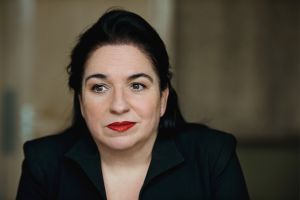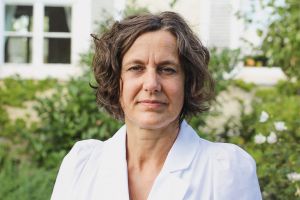Since mid-May, Burgtheater ensemble member Maria Happel has officially been the Max Reinhardt Seminar new head. Together with her deputy, lead voice and speech professor Annett Matzke, she’s aiming above all to strengthen the notion of the ensemble at this legendary acting and directing school over the coming years. Happel and Matzke joined mdw Magazine to talk about guiding the Seminar through the waters ahead, the mission of all magicians, and why they’ve moved to abolish use of the informal address.
By now, Maria Happel’s new corner office at the Max Reinhardt Seminar has come to feel like home. But in her present position, this audience favourite from the Burgtheater is actually something of a newbie. After all, it was just recently—on 18 May—that the 57-year-old was officially appointed head of this legendary acting and directing school. Happel admits to some ambivalent feelings about the Seminar’s elite school nimbus: “We certainly do orient ourselves on Max Reinhardt, our founder. But even so, I can’t let myself be burdened to the point of paralysis by the pressure that comes with such a big name.” She asserts that tradition doesn’t prevent innovation, but in fact causes it.

Choosing a nautical metaphor, Happel states her intention to carefully turn this gigantic, renowned tanker in a new direction. “The Reinhardt Seminar is steaming ahead at full speed. So you can’t just come along and say: Hello, I’m the new captain. Reverse course—now! We’d capsize.” The new captain has at her side an experienced helmswoman in the person of Annett Matzke, who’s been teaching here since 2004. And though Happel had no say in her appointment, Matzke was indeed precisely the person with whom Happel wanted to work.
The German theatre pro Happel says that the principle of teamwork extends beyond the top—and that it’s in fact central to her vision of an ideal acting school: “For me, it all comes down to the notion of the ensemble. And the first ensemble in these up-and-coming actors’ careers is the one right here.” The Seminar’s job, she says, is to convey a respectful feeling of community: “No one can play a king alone. The others always play him, too.” Happel was lucky enough to experience a number of theatre ensembles where, as a young artist, she was taken by the hand. “That’s perhaps gotten lost a bit,” she says with regret.
But respectful interaction, she underlines, shouldn’t be confused with a lack of distance: “That’s why I’ve reinstated the formal address (Sie) at the Reinhardt Seminar.” Doing this, she says, creates an opportunity to celebrate a theatrical graduation ritual: “When we see off a year’s class, that’s when we can fraternise. I, as the older colleague, offer the informal Du-address. And from that point onward, were on an even footing.” For ultimately, she says, the core idea of the Reinhardt Seminar can be boiled down to one sentence: “We want to send people out into the world who are wise and educated.”
This holistic approach doesn’t exclude the actual tools needed by up-and-coming actors and directors. Indeed, “It’s important for students to learn solid skills. Because those are timeless—regardless of passing theatrical fashions,” clarifies Matzke: a departing Reinhard Seminar graduate, she explains, needs to have acquired the unconscious skill of having body and voice available to them as instruments.
Without discipline and hard work, that won’t happen. Which is why it’s sometimes the case, she says, that 30-percent talents with a solid work ethic ultimately end up at 90 percent, while 70-percent talents with a tendency towards laziness stagnate. Which does she ultimately prefer? “70-percent talents who work hard—because those also exist,” says Happel with a laugh.
At the same time, these two experienced theatre experts still do believe in a certain undefinable factor. “That’s the thing with charisma. Some people just don’t have it, no matter how much they work and toil,” says Matzke by way of description. And there just are those inexplicable things like that ideal state where an evening of theatre virtually “shimmers”, agrees Happel: “That can’t be planned, but such moments are something that we try to use our skills to make happen. We always get pretty close—and sometimes, it works.”

Ultimately, they agree, one can only ascertain that the acting profession just plain does have a lot to do with magic—which is why the Reinhardt Seminar relies on a guild of experienced magicians. “In my vision of an acting school, the old magicians whisper their secrets into the young ones’ ears,” is Happel’s poetic metaphor. And one element of this approach is a new format entitled “Alte Meister” [Old Masters] in which theatrical greats share their ideas with their younger colleagues.
While training for film work will be receiving increased attention under Happel and Matzke, the new Seminar head remains focused on theatre as such: “To Max Reinhardt, doing and watching theatre was a primal human drive. And this faith in theatre’s immortality is something we uphold.”
The fact that the Max Reinhardt Seminar’s community of faith also includes directing students is something that Happel views as a unique feature and as central to this institution’s self-definition. “Like Reinhardt, we assume that every good director is inhabited by a good actor. And for any director, it can’t hurt to know what acting entails for the actors themselves.”
This also comes with a positive side-effect, says the great actor Maria Happel with a twinkle her eye: “We’re working here with the directors of the future—who’ll hopefully cast us even when we’ve gotten old. Which is to say that in doing this work, I’m also making provisions for my own golden years.”

